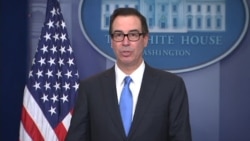The U.S. Treasury has slapped sanctions on hundreds of employees of a Syrian research center that Western analysts say develops chemical weapons like those thought to be used by government forces against civilians in Syria's long-running civil war.
These expanded sanctions, announced Monday in Washington, target workers at the Syrian Scientific Studies and Research Center, a Damascus-based facility linked to the research and development of biological, chemical and missile related technology.
The website GlobalSecurity.org alleges that the development of chemical weaponry at the center is secretly aided by Russian chemical experts.
The sanctions come three weeks after a suspected sarin gas attack in Syria's Idlib province killed at least 87 civilians and disfigured or otherwise incapacitated more than 300 others.
That April 4 attack, linked to government forces, sparked international outrage and prompted U.S. President Donald Trump to retaliate with a huge cruise missile attack on a Syrian government airbase.
WATCH: Mnuchin on new sanctions
Sanctions freeze assets
Monday's Treasury directive orders U.S. banks to freeze all U.S. assets of 271 employees of the center, and bans U.S. companies from conducting business with them. Other administration officials, speaking to reporters Monday, described the targeted workers as “highly educated” people able to travel abroad with the help of the international financial system.
“These sweeping sanctions target the scientific support center for Syrian dictator Bashar al-Assad's horrific chemical weapons attack,” said Treasury Secretary Steven Mnuchin.
The secretary also described the sanctions as a “strong message ... that we will hold the entire Assad regime accountable for these blatant human rights violations.”
Bush ordered first sanctions in 2005
Former President George W. Bush first placed sanctions on the facility in 2005 on suspicion that its workers were developing weapons of mass destruction.
Last year, President Barack Obama sanctioned an array of companies doing business with the center, and earlier this year, Washington imposed penalties on senior center officials linked to chemical weapons research and development.
Some international relief workers have complained that earlier Western trade sanctions made it difficult to navigate a shifting system of licenses, export controls and other prohibitions that restricted the ability of workers to obtain critical medical supplies.
As an example, relief workers last year cited bans on “dual use” items, including piping used in drilling that is also used to deliver fresh water to civilians and medical facilities in a country wracked by years of drought and warfare.














